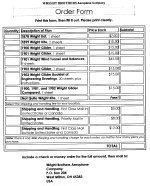WRIGHT
BROTHERS Aeroplane
Company
![]()
![]()
![]()
The 1878 Wright BatIn 1878, Bishop Milton Wright, Wilbur and Orville's father, came home and gave the brothers a small rubber band-powered flying toy they called their "bat." It was based on a Penaud helicopter, but only had a single rotor. It was a small, frail thing and the brothers played with it until they wore it out. Then they began to make their own copy. They were still making these toys for the enjoyment of their nieces and nephews while they were building their gliders and Flyers. Single 11" x 17" sheet, $7.00. |
 |
The 1899 Wright KiteTo test their revolutionary theories about aircraft control, the Wright brothers built a series of biplane "kites," They weren't kites exactly, but model gliders designed to be tethered and controlled from the ground. By pulling on the control strings, the Wright bothers could twist the wings of the kite and roll it right and left. The Wrights were the first to realize that you had to roll an aircraft to turn it or balance it laterally. Two 11" x 17" sheets, $10.00. |

|
The Not Quite Wright KiteThis is a 5/8 scale model of the 1899 Wright Kite that we have adapted to be easy to build and easy to fly. We are trying to get these plans into the hands of as many young people as possible to help tell the Wright story and foster an appreciation of our aviation heritage, so we include one FREE with every order. If you don't want it, find a student or a teacher to give it to. Feel free to make as many copies as you can give away. |
 |
The 1900 Wright GliderThe Wrights first man-carrying glider was a simple affair with a wingspan of just 17-1/2 feet. It was built in Dayton, Ohio and test-flown on the windswept dunes of Kitty Hawk, North Carolina. The controls worked well -- the Wrights were pleasantly surprised at their effectiveness. But the wings did not generate enough lift for manned flight except in very high winds, The Wrights flew it mostly as a kite, making only a dozen or so manned glides. Single 17" x 22" sheet, $15.00. |
 |
The 1901 Wright GliderThe Wrights' second glider was much larger, with a 22-foot wingspan and nearly twice as much wing area. But it still didn't produce the lift the brothers expected. And the control seemed much less effective. Overall, its performance confused and frustrated them so much the Orville said it was all he could do "to keep Wilbur in the flying business." Despite its poor showing, the 1901 glider was an important step in the invention of the airplane -- it revealed the need for basic research in lift and drag. Single 17" x 22" sheet, $15.00. |
 |
The 1901 Wright Wind Tunnel and BalancesThe Wrights came home to Dayton from Kitty Hawk in 1901 and built their own wind tunnel to test the data they had been using to design their aircraft. Using two unique balances to measure lift and drag, the Wright tested dozens of wing shapes and compiled the first accurate table of lift and drag. The plans include engineering drawing for the tunnel and air scoop, the lift balance, the drift balance, and all of the wing shapes the brothers are known to have tested. Nine 11" x 17" sheets, $45.00. |

|
The 1902 Wright GliderFrom the first time the Wrights flew it, they knew the 1902 glider was a winner. Designed using the data gleaned from their wind tunnel, it produced sufficient lift to fly in light winds. It was responsive to the controls. And after a season of test flights, they refined the controls to include aerodynamic surfaces for roll, pitch, and yaw. This three-axis control system was the basis for the grandfather patent of the airplane, and became the Wrights most important contribution to aeronautics. Single 17" x 22" sheet, $15.00. |
 |
The 1902 Wright Glider BookletThese plans show the same glider as described just above, but they are a full set of engineering drawings, detailing every single part in the 1902 Wright Glider. We've put this together especially for people who wish to build accurate historical replicas of this important aircraft. Twenty 11" x 17" sheets with instructions and photos, $75.00. |

|
The Wright GlidersThree sets of drawings on a single sheets, comparing all three of the
Wright glider -- 1900, 1901, and 1902. Believe it or not, this has never
been done before! Makes a great poster to frame, if you happen to be an
aviation history nut -- or know one. Includes three elevations of each
glider, plus specifications. Single 17" x 22" sheet,
$15.00. |
 |
OrderingIf you'd like to purchase these plans, click the image to the right and print out the order form that comes up on your screen. Send us a check or money order for the plans you want, plus the shipping and handling needed to send them. Mail your order to:
|
 |